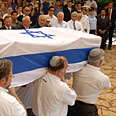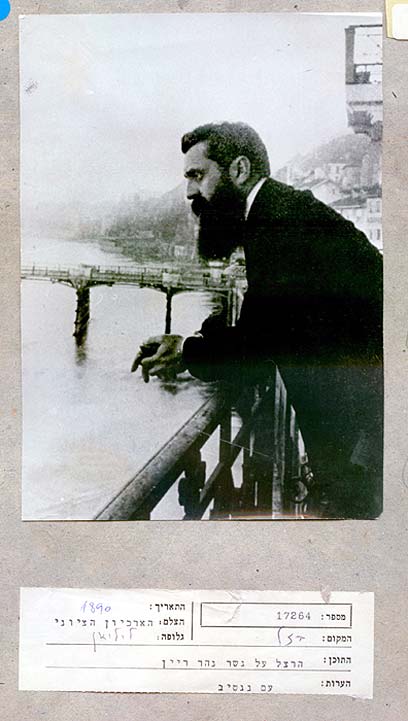
Burial ceremony of Herzl's daughter
צילום: שלום בר טל
Herzl Day
Israel marks, for only the second time, the birthday of the founder of the Zionist movement, Binjamin Ze'ev Herzl
For the second time ever, Herzl Day is held today throughout the country to commemorate the vision and activities of the founder of the Zionist movement. In 2004 the Knesset passed the Binjamin Ze'ev Herzl Law aimed at teaching future generations about Herzl's vision, heritage and activities. The law marks Herzl's birthday, Iyar 10th, as a National Day. This year, Iyar 10th fell on Saturday and therefore was rescheduled to Sunday (today).
Founder of the Zionist movement
Benjamin Ze'ev (Theodor) Herzl was born in 1860 in Budapest, Hungary. In 1884 he completed his doctoral law studies but a year later changed careers and dedicated himself to journalism and literature. Between 1891 and 1895 Herzl served as the Parisian correspondent of the Austrian newspaper Neue Freie Presse where he covered the Dreyfus Affair, a notorious anti-Semitic incident in France in which a French Jewish army captain was falsely convicted of spying for Germany.

Herzl's famous photo on the balcony in Basel (courtesy of KKL)
The young man was shaken by the mass rallies in Paris following the Dreyfus trial where many chanted "Death to the Jews!", and realized that the only solution to the plague of anti-Semitism was an independent Jewish state.
In June, 1895, he wrote in his diary: "In Paris, as I have said, I achieved a freer attitude toward anti-Semitism... Above all, I recognized the emptiness and futility of trying to 'combat' anti-Semitism."
In 1897, at considerable personal expense, he planned the first Zionist Congress in Basel. He was elected president, a position he held until his death in 1904, and in 1898 he began a series of diplomatic initiatives intended to build support for a Jewish country.
In 1898 he visited Palestine where he was received by the German emperor. In May, 1901 he met for the first time with the Sultan of Turkey, but the Sultan refused to cede Palestine to Zionists. Therefore he began exploring other options including establishing a Jewish state in the Sinai Peninsula, Cyprus and Uganda.
Herzl did not live to see the rejection of the Uganda plan; he died in Vienna in 1904 of heart failure at age 44. His will asked that he be buried in the future Jewish state together with his three children. In 1949 his remains were moved from Vienna to Mount Herzl in Jerusalem. In 2006 the remains of two of his children were moved from Bordeaux, France, and placed alongside their father










